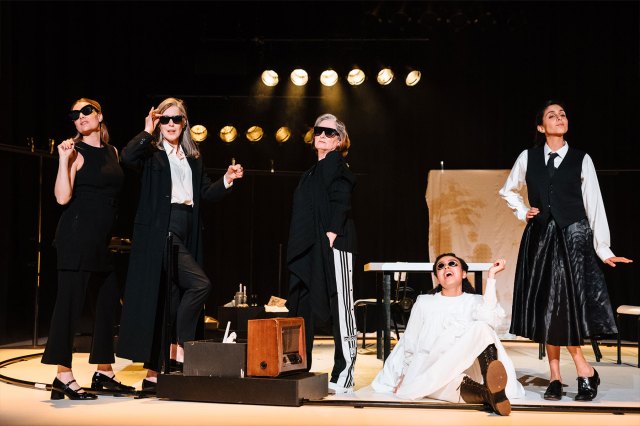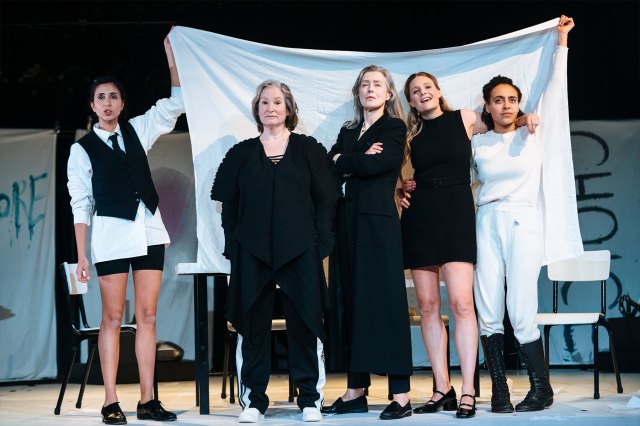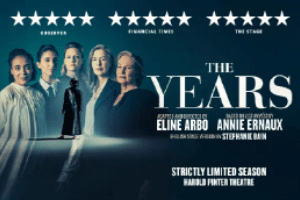The Years West End review – this play cannot be missed
The Almeida production continues through to 19 April at the Harold Pinter Theatre

There’s a lot of Greek tragedy on stage in London at the moment. Yet the play that comes closest to Greek’s theatre’s belief in a communal rite of shared experience is not Oedipus or Elektra, but The Years, an exceptional dramatisation of Annie Ernaux’s autobiographical novel about one woman’s life.
Spanning the years from 1941 to 2006, the story is told by five exceptional actors: Deborah Findlay, Romola Garai, Gina McKee, Anjli Mohindra and Harmony Rose-Bremner. Each brings wit, flair and her own presence to playing the heroine at a particular point in her growing up – childhood, adolescence, young married, empty nester, old age – and also provides the characters, narration, and even live music that surround her. As one age passes into the other, each actress gently touches her successor, a smiling benediction for the story to come.
In director Eline Arbo’s elegant adaptation of Stephanie Bain’s English translation, each part of the story begins with a scene where the woman is being photographed, pursing her cheeks, slumping her shoulders, flicking her hair in response to the spoken description of the picture. The result is very funny – McKee’s look of horror as she is described as looking tired – but also a way of marking not only the passage of time, but also changing attitudes to women’s lives.
After each photograph, the white cloth used as a backdrop is turned into a tablecloth for family meals that serve the same purpose, as the conversation shifts from wartime starvation through ’60s and ’70s idealism and ’80s disillusion, to the latest iPhone. In the artful simplicity of the staging, these cloths are also shaped by the performers to become everything from a newborn baby to a much-loved cat. At the close, on Juul Dekker’s bare set, with a turntable of musical instruments revolving around that central table, they are hung like banners, stained and battered with the events of a life.
All these carefully wrought effects bind the play together, but it is the words and the performances that elevate it into such an emotional, coruscating experience. Ernaux writes with devastating honesty about the events of her life: Garai’s long description of an illegal abortion has already become famous for its intensity. The silence in the theatre after that scene is total. The play is equally powerful on the failure of liberation truly to liberate, but also on the ongoing hopefulness of love.

By marking the traumas the woman experiences – the loss of virginity that is like sexual assault, the juggling of work, children and housework that stops ambition, the loss of a lover who has become an obsession – the play paints a complex picture of the gaps between words and reality, of the way that reading Simone de Beauvoir and dreaming of choice are constantly brought up against the more practicalities and realities of everyday life.
Around the markers of the woman’s life, Ernaux’s words and Arbo’s direction weave a complex, multi-faceted picture of the events in society as a whole, the way consumer goods alter and shape views, the failed hopes of the 1960s, the spaced-out peace and love of the 1970s giving way to a the technology-driven modern world.
The Years is above all a memory play, placing layer upon layer of allusive feeling on top of each other to build an entire portrait of a world. What’s difficult to convey about it, is how rich and often incredibly funny it is. Some of the events depicted are upsetting, but others are keenly observed manifestations of social trends: McKee contorting herself into different shapes while spouting the benefits of yoga, Garai reeling a trance as the drug culture hits the chattering classes, Mohindra bopping wildly to Bill Haley.
Its effect is like that of life itself. A palimpsest of good and bad, joy and sorrow, constant hope and regular disappointment. As the woman ages, she begins to have a different perception of time, seeing her life not as something apart, but as something shared. The actors very rarely speak of I – it is always “we”, and “us” and finally, as Findlay turns to the audience “you”.
The Years is an act of collective remembering and celebration. We may not have lived through the events described, but our grandmothers, mothers and friends have. This is why, though it is women who lean most strongly into the play, it speaks to men too. Its transfer from the Almeida to the West End gives a much wider audience a chance to experience its alchemical magic. Utterly unmissable.
















